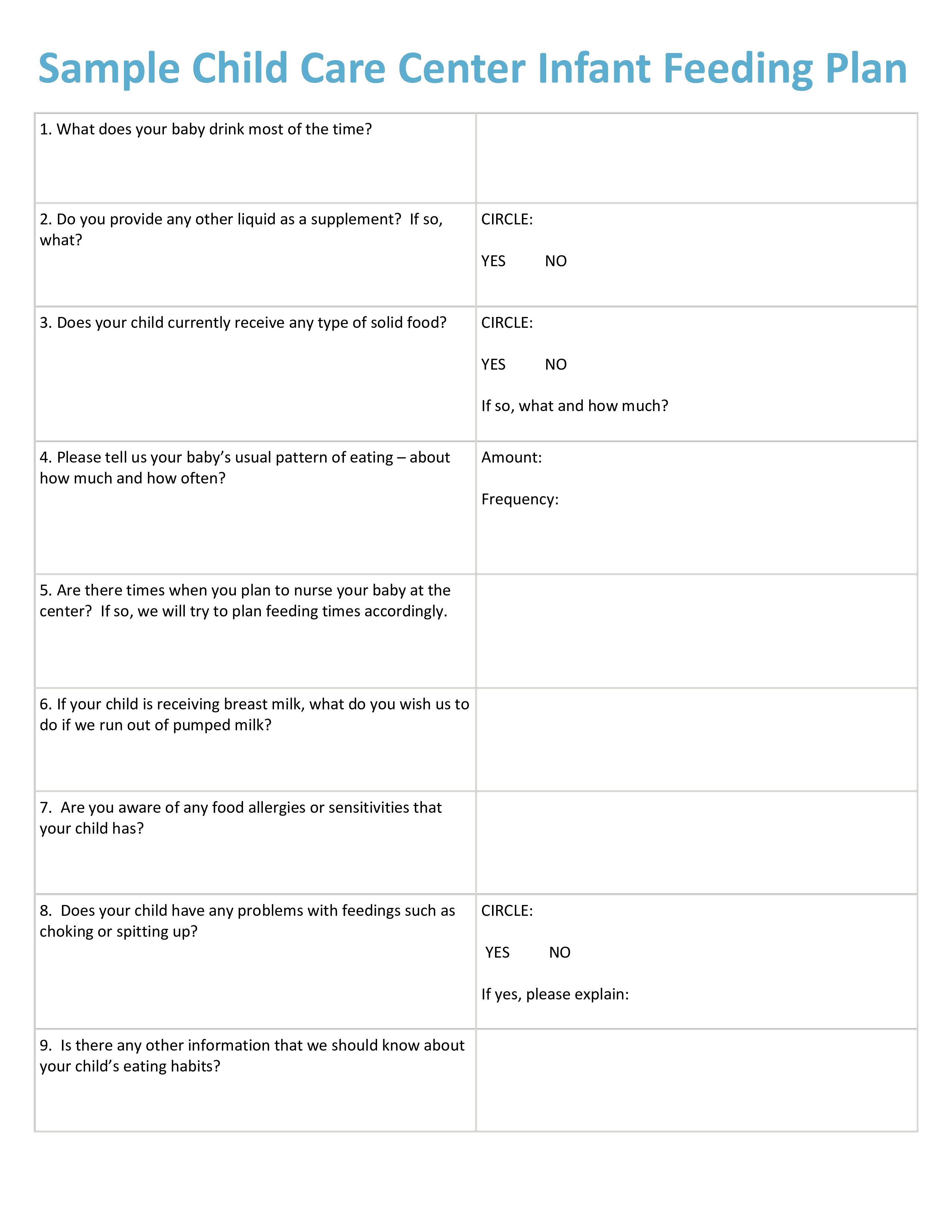Infant Feeding Schedule For Daycare
Save, fill-In The Blanks, Print, Done!

Download Infant Feeding Schedule For Daycare
Adobe Acrobat (.pdf)- This Document Has Been Certified by a Professional
- 100% customizable
- This is a digital download (523.41 kB)
- Language: English
- We recommend downloading this file onto your computer.
How to create an Infant Feeding Schedule For Daycare? An easy way to start completing your document is to download this Infant Feeding Schedule For Daycare template now!
The Child Care instant feeding schedule strives to accommodate each child’s needs and understands that every baby has a different pattern of eating. In most cases, we believe that feeding “on cue” is the healthiest way to eat. In other words, we will feed your infant when she shows signs of being hungry, and we will stop feeding when she shows signs of being full. Recommends waiting until about 6 months of age before starting solid foods. We only bottle-feed infants less than 6 months with mother’s milk or formula (no water or juice unless requested by a physician). Infants over 4-6 months are spoon-fed age-appropriate solid foods and given water or 100% fruit juice, in addition to breast milk/
formula, when they are able to drink from a cup.
Parents are required to provide clean, labeled bottles daily. Labels should be water-resistant and include the infant’s name and the date and time of preparation. We want your input and preferences about the way your baby is fed.
Please answer the questions on the back of the paper so that we can work together to provide your child with the safest, best nutrition.
Sample Child Care Center Infant Feeding Plan
- What does your baby drink most of the time?
- Do you provide any other liquid as a supplement? If so, what?
- Does your child currently receive any type of solid food? If so, what and how much?
- Please tell us your baby’s usual pattern of eating – about how much and how often? Amount, Frequency.
- Are there times when you plan to nurse your baby at the center? If so, we will try to plan feeding times accordingly.
- If your child is receiving breast milk, what do you wish us to do if we run out of pumped milk?
- Are you aware of any food allergies or sensitivities that your child has?
- Does your child have any problems with feedings such as choking or spitting up? If yes, please explain:
- Is there any other information that we should know about your child’s eating habits?
Every day brings new emails, documents, and task lists, and often it is not that different from the work you have done before. Many of our day-to-day tasks are similar to something we have done before. Don't reinvent the wheel when you need a feeding schedule.
Instead, we provide this standardized Infant Feeding Schedule For Daycare template with text and formatting as a starting point to help professionalize the way you are working. Our private, business and legal document templates are regularly screened by professionals. If time or quality is of the essence, this ready-made template can help you to save time and to focus on the topics that really matter!
Using this document template guarantees you will save time, cost and efforts! It comes in Microsoft Office format, is ready to be tailored to your personal needs. Completing your document has never been easier!
Download this Infant Feeding Schedule For Daycare template now for your own benefit!
This Infant Feeding Plan was created for: (Child’s name) This Infant Feeding Plan was created by: Teacher’s name and signature: Parent’s name and signature: Date (s) this plan was created/revised: This project is a collaboration between Our Lady of the Lake Children’s Hospital, the Louisiana Breastfeeding Coalition, local breastfeeding coalitions, Volunteers of America/Partnerships in Child Care, and the Louisiana Office of Public Health-Maternal and Child Health Program..
DISCLAIMER
Nothing on this site shall be considered legal advice and no attorney-client relationship is established.
Leave a Reply. If you have any questions or remarks, feel free to post them below.
Related templates
Latest templates
Latest topics
- GDPR Compliance Templates
What do you need to become GDPR compliant? Are you looking for useful GDPR document templates to make you compliant? All these compliance documents will be available to download instantly... - Google Docs Templates
How to create documents in Google Docs? We provide Google Docs compatible template and these are the reasons why it's useful to work with Google Docs... - IT Security Standards Kit
What are IT Security Standards? Check out our collection of this newly updated IT Security Kit Standard templates, including policies, controls, processes, checklists, procedures and other documents. - Letter Format
How to format a letter? Here is a brief overview of common letter formats and templates in USA and UK and get inspirited immediately! - Google Sheets Templates
How to work with Google Sheets templates? Where to download useful Google Sheets templates? Check out our samples here.
cheese

